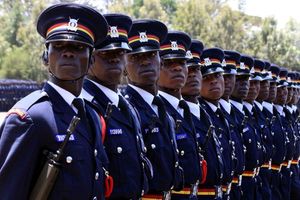Breaking News: Former Lugari MP Cyrus Jirongo dies in a road crash

Deputy National Security Advisor Joseph Boinnet.
Details of a secret meeting between government officials from Kenya, Haiti and the United States over Nairobi's deployment of police officers to help the Haitian authorities deal with insecurity in the Caribbean country have been revealed.
The meeting, which took place in the US, had seen a number of officials leave Kenya to discuss the deployment process, even in the face of a court order stopping the process, which President William Ruto's administration has said it will appeal and realign the details of the deployment to comply with the ruling.
Last weekend, Deputy National Security Advisor Joseph Boinnet led a Kenyan delegation to the US to discuss the process of deploying 1,000 officers to the Caribbean nation.
A source privy to the ongoing matter told the Nation that a number of issues were discussed during the three-day meeting that started on Tuesday this week.
"During the meeting, a Memorandum of Understanding (MoU) was drafted which included a date by which the Kenyan officers are expected to arrive in Haiti. But by the time the meeting ended, they had not agreed on the exact day the officers will leave Kenya," said our source, who spoke on condition of anonymity because of the sensitivity of the matter.
The source said, however, that the Kenyan team did commit to communicating the exact day the Kenyan officers will leave the country next week.
Also discussed during the meeting were logistical issues on how the Kenyan officers will be able to move from one point to another during their stay in Haiti.
They also discussed compliance, monitoring, equipment requirements, operations and human rights issues that have been raised against the Kenyan police," our source added.
The Haitian team confirmed the meeting in a statement from the country's Ministry of Justice.
"Intense discussions took place between the two delegations to bring it in line with the legislation of both countries," Haiti's Ministry of Justice said, according to the Miami Herald, a US publication.
"A final decision on the text and its signature by both parties should be made early next week."
The human rights issue was raised after concerns were raised by some members of the US Congress in December 2023.
In a letter addressed to Anthony Blinken, the US Secretary of State, the six claimed that the Kenyan police had a history of human rights abuses and that their presence in Haiti would worsen the situation. The letter was written on December 8, 2023, but the details released this week were also part of the discussion.
"Another armed foreign intervention in Haiti risks further destabilising the country and will not lead to the necessary Haitian-led transition to democratic government," read part of the letter.
They based their arguments on how police officers dealt with opposition supporters, where 23 civilians lost their lives in incidents documented and condemned by the UN, Amnesty International and Kenyan human rights groups.
The Kenyan officers' main task is to help their Haitian counterparts deal with violent gangs that have made the Caribbean country ungovernable.
Were it not for a Kenyan High Court order, the officers could have been deployed to Haiti as early as June last year.
President Ruto, who also supports the deployment, has said in the past that the orders will be appealed and that his plans will never be stopped by the courts and will go ahead.
It remains unclear how the MOU will proceed, given that the matter is still before the courts.
While visiting the US for the meeting, Walter Nyakieya Nyamato, a senior officer who served as the Personal Assistant to Deputy Inspector General Noor Gabow, died.
He was found dead in a hotel room in Washington DC.
The death of the officer, who was based at Jogoo House, which occurred on Tuesday, remains a mystery and the cause has not yet been made public.
The Haitian government made it clear during the meeting that it was working to ensure that the long-awaited deployment would be secured.
Kenya had planned to send its officers to Haiti in January, but this was stopped by a court order pending a decision on whether it was constitutional to make such a move and use regular police officers.
In an annual budget estimate, the Kenyan government has asked for Sh36 billion to prepare its 1,000 troops for Haiti, indicating the cost the international community will have to foot to run the mission initially.
This was revealed by Interior CS Prof Kithure Kindiki, who told parliament in November 2023 that the money would be used to buy equipment and prepare officers to go to Haiti.
It is worth noting that the cost of the mission will be paid into a trust fund voluntarily by United Nations (UN) member states and organisations.
The gangs in Haiti have already sent a stern warning to Kenya through a leader, Jimmy Barbecue, asking them not to dare send officers there.
When it was announced that Haitian government officials were to meet their Kenyan counterparts in the US to discuss the deployment, things got out of hand in the Caribbean nation.
On Sunday this week, almost 20 hectares of sugar cane in one of its fields was set on fire by unknown assailants.
A company called Barbancourt announced that its foundation was also suspending all services, particularly in the north of Port-au-Prince, the capital of Haiti.
This means that people there will no longer receive free water and there will be no health services.
In January 2024, the UN, through its Human Rights Commissioner Volker Türk, said that more than 800 people had been killed, injured or kidnapped across Haiti. This is more than three times the figure for the same month in 2023.
The deployment of police officers to Haiti was requested by Prime Minister Ariel Henry in October 2022 and approved by the UN Security Council in 2023.









